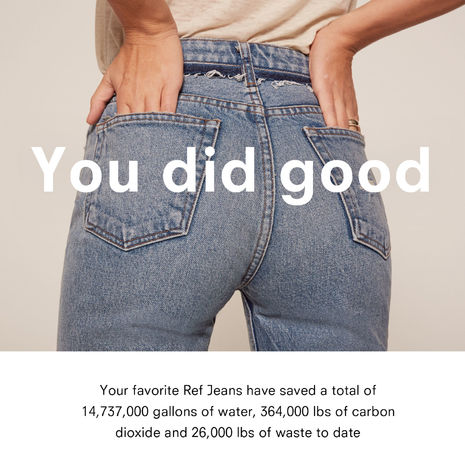The problem with ethical fashion
Is sustainability just the latest fad? Fashion Editor Mier Foo explores whether ethical consumption can really exist in the mainstream fashion market.

Sustainability is now the zeitgeist of contemporary fashion. Brands are under more pressure than ever from consumers to adopt ethical practices or be rendered obsolete. According to the 2018 State of Fashion report by the Business of Fashion & McKinsey, 66% of global millennials are willing to spend more on brands that are sustainable. Whilst 90% said they would boycott a brand if it was not sustainable. This is especially significant since millennials now have the greatest purchasing power of any generation and have the potential to effect significant change in an ever-evolving industry.
"Sustainable brands are still disproportionately skewed towards targeting millennials with higher spending powers."
Despite the demand for ethical fashion at an all-time high, there are only a handful of ethical brands that align with millennial tastes. Notable names such as Eileen Fisher and Stella McCartney have been frontrunners in championing sustainability within the industry but cater largely to the luxury market. Clothes from famous mainstream brands such as Patagonia and The Reformation are priced on average in the low three digits, just enough to position the brands between the boundaries of affordable and luxury. Acceding to demand from consumers for more affordable prices, The Reformation created a sister line, RefJeans, which debuted in 2017. In its press release, founder Yael Aflalo cited the inspiration for the line as her answer to tackling “the worst polluting type of clothing that we buy all the time — denim. My biggest dream is to bring sustainable fashion to everyone." Still, a quick browse on their website shows a pair of their ‘classic sweatpants’ listed for £84, when a stroll down the high street could yield a strikingly similar pair for the fraction of the price. This reveals how sustainable brands are still disproportionately skewed towards targeting millennials with higher spending powers. How can we expect consumers to make conscious choices if there is a lack of viable options available to them?
"Herein lies the paradox of sustainable fashion, it creates a need which it then fills."
The Reformation posit themselves from the outset as the ethical choice, with sustainability interwoven into the core of their identity. The description that accompanies each piece of clothing is pithy and sleek — ‘Hungover? Heartbroken? Grocery run? These are for you.’, it practically teases. Yet their accountability comes across deceptively simple, they state that upon purchasing said pair of sweatpants, one saves 8.0 lbs of carbon dioxide, 720.0 gallons of water and 1.2 lbs of waste — how exactly this is calculated is not divulged. Wouldn’t it make more sense to not buy a pair of sweatpants you don’t necessarily need?

Herein lies the paradox of sustainable fashion, it creates a need which it then fills. This is encapsulated in its manufacturing model, where clothes can go from design to fruition in a matter of weeks, echoing the fast-fashion life cycle where efficiency is key in order to stay on top of trends and stimulate demand. Aflalo believes that “the prevailing sustainable platform—‘Buy less, use less’—isn’t a scalable strategy”. The Reformation thus fills that gap; it offers shoppers in return peace of mind, as one customer calls it ‘shopping without the guilt’ (well, if you can afford it). As the founder of Reformation once told Vogue: “You buy clothes because you really want them. The sustainability part is for us to figure out.”
Similarly, Stella McCartney has been criticised for using sweatshop labour in her collaboration line with Adidas where a pair of leggings can cost up to £120. A spokesperson for Ms McCartney called the issue an “Adidas supply chain matter” and asked that all enquiries be directed to Adidas instead. It is highly unlikely that a brand that has been synonymous with ethical fashion since its conception is unaware of such commonplace exploitative practices being carried out in the industry, especially by fast-fashion brands. If consumers are expected to make conscious decisions in their purchases, so brands should be held accountable for partnering with companies whose practices conflict with their own ethos. Abdicating responsibility upon the first sign of controversy calls into question just how ethical a brand really is if they refuse to practice what they preach.
"In an age where value-driven consumers are incentivising brands to become adopt sustainable practices, brands simply cannot afford to remain silent."
In an age where value-driven consumers are incentivising brands to adopt sustainable practices, brands simply cannot afford to remain silent. Yet, it is important to ensure that sustainability is not simply being used as a buzzword to prey on unsuspecting consumers. H&M’s newly launched ‘Conscious Collection’ is testament to the fact, after being found guilty by Norway’s Consumer Authority of misleading consumers about the true nature of their sustainable clothing collection based on the ‘greenwashing statements’ made by the company on their website. The company also offers a clothing recycling programme where customers can bring in old clothes to be recycled at any participating store in exchange for a H&M gift voucher — a marketing technique which rehabilitates the image of the brand, whilst encouraging consumers to buy more clothes. The irony of such an incentive is especially apparent when you consider that it would take the company 12 years to recycle what they produce in a day.
A study conducted by the Stern Center for Sustainable Business at New York University found that products that were marketed as ‘sustainable’ sold significantly faster than products which were not. The financial motivations for brands to embrace sustainability are clear but it must come hand in hand with accountability. These incidents are a timely reminder that no matter how ethical a brand claims to be, fashion is still first and foremost a business, concerned predominantly with its bottom line, profit.
 News / Colleges charge different rents for the same Castle Street accommodation2 March 2026
News / Colleges charge different rents for the same Castle Street accommodation2 March 2026 News / King’s hosts open iftar for Ramadan3 March 2026
News / King’s hosts open iftar for Ramadan3 March 2026 Theatre / Lunatics and leisure centres 4 March 2026
Theatre / Lunatics and leisure centres 4 March 2026 News / Angela Merkel among Cambridge honorary degree nominees27 February 2026
News / Angela Merkel among Cambridge honorary degree nominees27 February 2026 News / News in Brief: waterworks, wine woes, and workplace wins 1 March 2026
News / News in Brief: waterworks, wine woes, and workplace wins 1 March 2026







